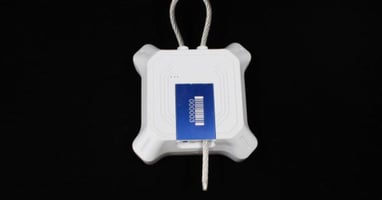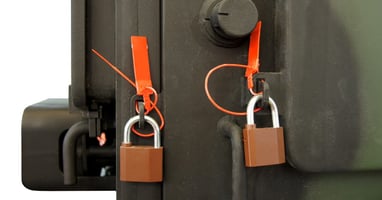In the supply chain, security breaches are becoming more sophisticated than ever. The future of...
How To Customize Security Seals To Meet Your Business Needs

Security seals protect inventory, medications, equipment, and assets across industries. Whether you oversee manufacturing lines, manage logistics for a distribution center, or do quality control checks within agri-business or healthcare, your operation depends on secure, trackable, and tamper-evident solutions. Discover how to customize security seals to meet your business needs and support your workflow.
Why Security Seals Matter to Your Organization
Security seals do more than lock containers or signal tampering. When used properly, they minimize risk across your supply chain. Security breaches threaten compliance, profitability, and safety. Thankfully, tailored seals minimize vulnerabilities by fitting seamlessly into your workflow. Here’s how they serve roles in various industries:
- Manufacturing: Guard product integrity through the production process.
- Distribution: Secure packages, pallets, and trailers during transit.
- Agriculture: Protect produce quality and ensure regulatory compliance.
- Healthcare: Prevent unauthorized access to medical supplies, pharmaceuticals, or hazardous waste.
- Logistics: Streamline chain-of-custody documentation for freight and high-value goods.
Exploring Security Seal Options
Before customizing a seal, you should understand your choices. Security seals come in several varieties, each adapted for particular environments and uses.
Bolt Seals
Bolt seals combine heavy-duty construction with a simple locking mechanism. Common in shipping containers and freight trailers, bolt seals resist forced entry attempts and typically require bolt cutters for removal. Some applications include cross-border cargo shipments, railcars and intermodal containers, and high-value overland freight.
Cable Seals
Using a steel cable, cable seals offer flexible, adjustable security. They are suitable for sealing tanker trucks, freight doors, and utility meters. You pull the cable through the locking body to achieve the correct length, snip off excess, and lock the mechanism. Choose cable seals for transporting chemicals or liquids, meter security (gas, electric, water utilities), and high-security storage units.
Plastic Tamper-Proof Seals
Plastic tamper-proof seals are by far the most versatile seals. Crafted from durable polymers, these single-use seals provide visual tamper evidence on everything from medication cabinets to agricultural bins. They provide customizable length, strength, and features for various needs, including pharmaceutical packaging and hospital carts, produce crates and food containers, postal bags, ATM cassettes, and ballot boxes.
Metal Strap Seals
Metal strap seals provide security with a stainless or galvanized steel strap that wraps around closures. They are durable, making them perfect for use in cargo trailers and containers, airline duty-free trolleys, and drums containing hazardous materials.
Padlock and Fixed-Length Seals
Padlock seals and fixed-length tags are ideal for clear, “one-way” closure on bins, cabinets, or containers. You can adjust their break strength, length, and color coding depending on operational needs or specific guidelines.

Customizing Security Seals Step-by-Step
Now that you understand your options, it’s time to create seals that fit your application. Here are features to consider when optimizing security, efficiency, and compliance.
1. Choose the Right Material
Material selection directly affects seal strength, durability, and application. Before deciding, consider your environment. Plastic (polypropylene or nylon) is flexible, light, and available in various colors. It is ideal for disposable, visual tamper-evidence applications that require moderate strength. Metal (steel or aluminum) is an excellent option if you need strength, durability, and resistance to extreme conditions.
If your seals need to withstand outdoor elements, heavy mechanical stress, or harsh chemicals, specify an appropriate grade (e.g., UV-resistant plastics or corrosion-resistant metals).
2. Select an Appropriate Security Level
Not all applications require high-security seals. Understanding the three classes of security seals can help you make an informed decision:
- Indicative: Deters opportunistic tampering. These seals are breakable by hand or with simple tools, so they work best for low-risk, high-volume situations.
- Barrier: Requires specialized tools for removal and deters more determined attempts.
- High-Security: Conforms to ISO 17712 standards for transport and customs. They are ideal for international containers and high-value goods.
3. Tailor the Size and Length
Seal size affects usability and security. With cable and plastic tamper-evident seals, specifying custom lengths prevents slack that could facilitate manipulation. On the other hand, fixed-length seals ensure consistency. For complex closures or large containers, you may need longer or thicker seals. Compact cabinets require shorter, slimmer designs.
4. Integrate Tracking and Identification
For audit-friendly operations, choose seals with sequential numbering, unique serial codes, or barcodes.
- Sequential Numbering: Ensures each seal is unique, aiding tracking and loss prevention.
- Barcode/QR Codes: Enables rapid scanning and digital recordkeeping for shipment manifests, medical logs, or compliance documentation.
- Custom Alphanumeric Codes: Integrates with your internal inventory or access control systems.
Since each one is unique, custom identification deters tampering while supporting reverse audits and chain-of-custody verification.
5. Add Custom Branding and Messaging
Security seals also serve as communication tools. Apply your company logo, regulatory warnings, or handling instructions via laser engraving, hot stamping, or inkjet printing.

6. Implement Color Coding for Workflow Efficiency
Custom color coding streamlines workflow and supports instant visual identification. It enables your team to identify and address anomalies at a glance.
- Red seals may indicate biohazardous material in hospitals
- Blue or green identifies perishable goods within agri-business
- Yellow signals high-priority shipments in distribution centers
7. Match Features to Industry Regulations and Standards
Many industries regulate the use of security seals.
- Food and pharma require FDA-approved materials for direct contact.
- Transportation of hazardous materials may require seals rated for chemical resistance.
- International shippers must use ISO 17712-compliant seals for customs acceptance.
Regardless of your industry, verify that your seal features match the external regulatory standards and your organization’s protocols.
Industry Examples for Security Seals
Manufacturing
You may need cable or plastic seals to secure and track equipment, restrict access to high-value parts, or comply with ISO certifications. Also, consider adding barcodes and brand logos for seamless inventory management and integration into quality assurance checks.
Distribution and Logistics
Bolt or metal strap seals on freight and transport doors stop unauthorized access. To streamline warehouse audits and loss tracing, use numbered and barcoded seals with your branding. Plastic color-coded seals improve visibility for time-sensitive or hazardous loads.
Agriculture
Custom plastic seals ensure that you can trace produce bins, chemical sprayers, and seed shipments from farm to fork. Incorporate tamper features and color codes for easy identification during FDA or agricultural audits, and request weather-resistant polymers for outdoor use.
Healthcare
Use lightweight, single-use, tamper-evident seals made of plastic for medication carts, sample bags, or patient test kits. Custom warning text on seals adds a layer of compliance for high-risk items.
Move Toward Better Security
Security seals are crucial components of your risk management strategy. Now that you understand how to customize security seals for your business needs, you can align your seals with your unique processes and compliance demands.
If you’re ready to enhance your security infrastructure, find security seals at Logimate. The perfect seal is a measurable boost in safety, compliance, and operational confidence.




